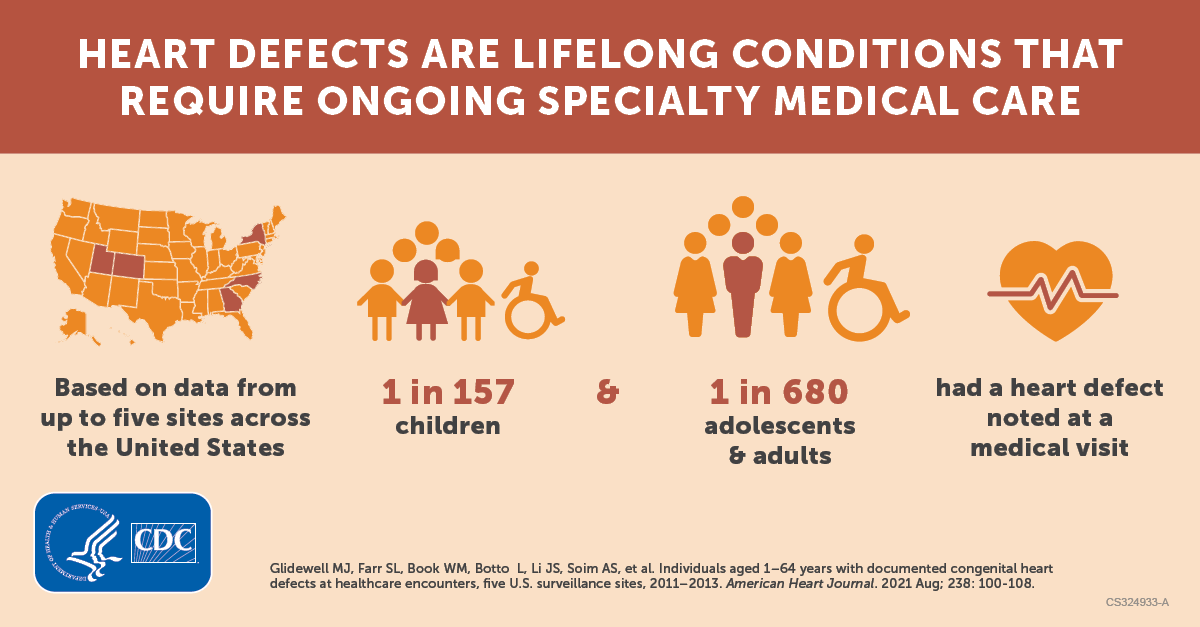Many U.S. Children and Adults Are Living with Heart Defects

It is important for people living with heart defects to talk with a heart doctor regularly to make the best possible choices for their health.
A study from the Centers for Disease Control and Prevention (CDC) in five sites across the United States found that 1 in 157 children and 1 in 680 adolescents and adults had a heart defect noted at a medical visit. Heart defects are lifelong conditions that require ongoing specialty medical care. It is important for people living with heart defects to talk with a heart doctor regularly to make the best possible choices for their health.
Read the full scientific article.
Main Findings
- Based on data between 2011 and 2013 from up to five U.S. sites, 1 in 157 children ages 1–10 years and 1 in 680 adolescents and adults ages 11–64 years had a heart defect noted in their health record at a medical visit.

- 1 in 4 people with a heart defect noted at a medical visit had a severe congenital heart defect, meaning it likely required surgery or other procedures in the first year of life.
- Children, adolescents, and adults with heart defects more commonly had public health insurance (insurance provided by the government) than private or commercial insurance, such as insurance provided by an employer.
- Understanding how many people in each age category are living with a heart defect can inform planning efforts to address the needs of this growing population.
About This Study
- CDC funded the University of Colorado in Denver; Duke University in Durham, North Carolina; Emory University in Atlanta, Georgia; the New York State Department of Health; and the University of Utah to estimate the number of people living with heart defects and better understand the survival, healthcare use, and longer-term outcomesof people living with heart defects.
- To be included in this study, people with heart defects had to have seen a healthcare provider and had their heart defect written down in their medical record between 2011-2013. People with heart defects that did not see a doctor during that time, or whose heart defect was not included in their medical record, were not included in this study.
- The estimated number of people with a heart defect who received medical care differed based on the source of information and the state or county where scientists collected data. Although estimates were similar across project sites, the number of people with heart defects may vary in other parts of the United States.
About Heart Defects
Congenital heart defects are conditions present at birth that affect the structure of a person’s heart and its ability to work properly. Lifelong cardiac care can help people with heart defects live as healthy a life as possible.
Our Work
CDC’s National Center on Birth Defects and Developmental Disabilities (NCBDDD(/ncbddd/index.html)) is tracking the number of people living with heart defects to learn about their long-term health, healthcare use, and quality of life. This information can help identify opportunities to support the health and wellness of all people living with heart defects. Learn more about CDC’s research and tracking of heart defects.
More Information
Reference
Glidewell MJ, Farr SL, Book WM, Botto L, Li JS, Soim AS, et al. Individuals aged 1–64 years with documented congenital heart defects at healthcare encounters, five U.S. surveillance sites, 2011–2013. American Heart Journal. 2021 Aug; 238: 100-108.